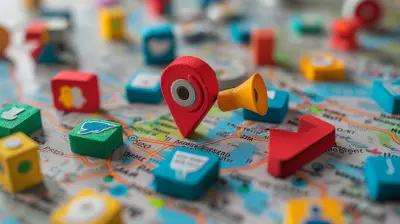The Role of Emotional Intelligence in Project Leadership
22 May 2025
As a project leader, you’re juggling tasks, deadlines, budgets, and team dynamics—all while trying not to pull your hair out midway through a meeting that should’ve been an email. Sound familiar? (I see you nodding.) But here’s the thing: mastering the technicalities isn’t everything. Sure, your Gantt charts, KPIs, and risk management strategies are tight, but if you lack emotional intelligence (EI), you’re basically piloting a ship with a rusty compass.
Emotional intelligence in project leadership might seem like corporate jargon at first glance. (I know, I rolled my eyes the first time I heard it, too.) But trust me, it’s a genuine game-changer for anyone managing people, deadlines, and expectations. So, buckle up, because we’re diving into the "why" and "how" of emotional intelligence becoming your best friend in project leadership. 
What Is Emotional Intelligence (And Why Should You Care?)
Alright, let’s break it down. Emotional intelligence, often shortened to EI or EQ (emotional quotient), is your ability to recognize, understand, manage, and influence your own emotions—and those of others.Think of it as a combination of self-awareness, empathy, and some Jedi mind tricks. Okay, maybe not Jedi-level, but close. It’s about managing yourself and the emotional barometer of your team so everyone stays productive and sane.
Now, why should you care? Because projects aren’t just about deliverables; they’re also about people. And people, my friend, are gloriously messy creatures with emotions that could rival a soap opera. If you can’t handle emotions—your own or others—you’re setting yourself (and your project) up for chaos. 
The Four Pillars of Emotional Intelligence
Like a sturdy table, emotional intelligence is supported by four legs (or pillars if you want to sound fancy). Let’s unpack these one by one:1. Self-Awareness
Self-awareness is like holding a mirror up to your soul. (Too poetic? Bear with me.) It’s about recognizing your emotions, strengths, weaknesses, and triggers. For instance, if you know that tight deadlines turn you into a caffeine-fueled grump, you can prepare for it.Why does this matter in project leadership? Because your mood sets the tone for the entire team. If you’re spiraling, they’ll spiral. You’re the thermostat, not the thermometer.
2. Self-Management
Self-awareness is pointless unless you know what to do with it. Enter self-management—the art of keeping your cool when the project goes off the rails. Your budget got slashed? Breathe. The client wants last-minute changes? Resist the urge to slam your keyboard.Good self-management isn’t about suppressing your emotions. It’s about channeling them constructively. Think of it as emotional jujitsu: using your emotional energy to fuel solutions rather than tantrums.
3. Social Awareness
Here’s where empathy takes center stage. Social awareness is the ability to "read the room" and pick up on what others are feeling or thinking—even when they’re not saying it outright. (Yes, it’s kind of like being a mind-reader. Sort of.)If your developer looks frazzled, maybe it’s not the best time to pile on another task. Or if your client seems hesitant, maybe they’re not sold on the latest proposal. In essence, social awareness helps you see beyond words.
4. Relationship Management
Leadership is a people game. Relationship management involves building trust, resolving conflicts, and inspiring your team to rally around the project. It’s the difference between being a boss people tolerate and a leader they’d go to bat for.
Why Emotional Intelligence Is a Secret Sauce in Project Leadership
Now that we’ve got the basics down, let’s dig into why EI is the secret sauce that turns a good project leader into a great one. (Spoiler: It’s not just about being "nice.")1. It Builds Stronger Teams
Ever worked in a toxic team environment? It’s like trying to row a boat with people drilling holes in it. Emotional intelligence helps you create a culture where team members feel heard, valued, and motivated.When you’re empathetic and approachable, your team feels safe to share ideas (even the crazy ones) and voice concerns without fear of judgment. That’s how innovation happens, my friend.
2. It Reduces Conflict (Or At Least Manages It Better)
Conflict is inevitable in projects. People are wired differently, and when you mix deadlines, stress, and varying perspectives, sparks fly. But with high EI, you can de-escalate conflicts faster than a firefighter putting out a kitchen blaze.For instance, instead of snapping at a team member who misses a deadline, you might ask, “What happened? How can we prevent this next time?” It’s not about being a pushover; it’s about addressing the issue without fracturing the relationship.
3. It Enhances Decision-Making
Decisions in project management aren’t always black and white. Sometimes you’ve got to factor in the human element. Emotional intelligence helps you weigh not just the logical implications but the emotional ripple effects of your choices.Let’s say you’re deciding between assigning overtime to your team or extending the deadline. An emotional-intelligence-savvy leader would consider how each option affects team morale and long-term productivity—not just the project timeline. 
How to Develop Emotional Intelligence (No, It’s Not Too Late)
If you’re thinking, “Well, this all sounds great, but my EI score is probably hovering around zero,” don’t worry. Emotional intelligence isn’t some inborn trait that you either have or don’t. It’s a skill you can develop. Here’s how:1. Pause Before Reacting
This one’s a game-changer. When something triggers you, whether it’s a missed deadline or an eye-roll from a team member, hit the pause button. Take a deep breath and respond thoughtfully rather than reacting impulsively.2. Practice Active Listening
Active listening isn’t just nodding along while someone talks—it’s genuinely tuning in. Put away distractions, make eye contact, and repeat back what you hear to show you’re paying attention. (Yes, this works over Zoom, too.)3. Ask for Feedback
Self-awareness can be a blind spot. Sometimes, you need an outside perspective to identify areas for improvement. Ask your team for honest feedback about your leadership style—and be open to what they have to say.4. Empathize Before Acting
Before making a decision or giving feedback, try stepping into the other person’s shoes. What’s their perspective? How might your actions impact them? A little empathy goes a long way.Real-Life Examples of Emotional Intelligence in Action
Still not convinced? Let me give you a couple of real-world scenarios where EI turned the tide:Example 1: The Grumpy Client
You’re dealing with a client who’s nitpicking every detail of the project. Instead of getting defensive, you recognize that their anxiety stems from wanting the project to succeed. You take the time to reassure them, address their concerns, and involve them in the decision-making process. Result? A happier client and a smoother workflow.Example 2: The Overworked Team Member
Your star developer has been pulling late nights, and their productivity is tanking. Instead of reprimanding them for missed deadlines, you sit down to understand what’s going on. Turns out, they’re burnt out. You redistribute the workload and encourage them to take a day off. Result? A re-energized team member who’s ready to crush their tasks.Wrapping It All Up
Project leadership isn’t just about managing tasks—it’s about managing people. And people come with emotions that can either fuel the project’s success or derail it entirely. Emotional intelligence is the glue that holds it all together.By mastering self-awareness, self-management, social awareness, and relationship management, you’ll not only become a better leader but also cultivate a team that’s motivated, collaborative, and productive. So, the next time you’re knee-deep in project chaos, remember: emotions aren’t your enemy—they’re your secret weapon.
all images in this post were generated using AI tools
Category:
Project ManagementAuthor:

Baylor McFarlin
Discussion
rate this article
3 comments
Tatianna Stevens
Insightful read on leadership dynamics—thank you!
May 29, 2025 at 12:09 PM

Baylor McFarlin
Thank you for your kind words! I'm glad you found the article insightful.
Paris Cannon
In the realm of project dreams, Where vision and hearts align, Emotional intelligence weaves the thread, Guiding leaders with wisdom's shine. A tapestry, divine.
May 25, 2025 at 12:59 PM

Baylor McFarlin
Thank you for capturing the essence of emotional intelligence in project leadership so beautifully! Your poetic reflection highlights its crucial role in fostering collaboration and inspiring teams.
Rocco Clarke
What a great read! Emotional intelligence is such a crucial aspect of successful project leadership. Your insights highlight how understanding team dynamics can enhance collaboration and drive success. Thank you for sharing these valuable perspectives—it's a reminder of the human touch in leadership!
May 25, 2025 at 2:33 AM

Baylor McFarlin
Thank you for your thoughtful comment! I’m glad you found the insights valuable—emotional intelligence truly is key to effective leadership and teamwork.



